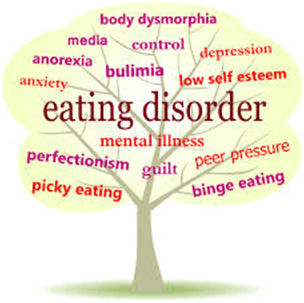When did food become my enemy? I, along with many others, am deeply conflicted over food and eating. I classify many foods as good or bad and my consumption of such foods in the same way (therefore my behaviour is ‘good’ or ‘bad’ too). And these categories are heavily weighted by their impact on my weight rather than nutritional value (although nutrition does enter into it.) In fact I can only think of one of my friends who categorises food according to good or bad by its nutritional benefits alone.
Of course my food consumption issues are driven by a sense of what I should look like. The media encourages us to judge and compare ourselves to the impossible images they present. Such media images are often manipulated to ‘improve’ even these ‘beautiful’ people. A wise woman once told me that she advised her daughters to compare themselves to women in the supermarket, ie to real people, rather than these false media images,.
Adverts for delicious food as well as slender, fit figures are everywhere in the media, the former making it even harder to attain the latter. We are encouraged to become ‘addicted’ to foods, both by advertising and their ingredients. Foods often comprise a clever mixture of chemicals, salts and sugars that encourage us to eat past the feeling of fullness or need for energy. And unlike other addictions we can’t actually give up eating without consequences worse than the addiction. We must negotiate the temptations all around us and develop habits that allow us to eat in a way that supports a healthy body.

I imagine the young are particularly at risk as we are so unsure of who we are, what we want and what will actually make us happy when we are developing. Research (For example The Famine Within, a Canadian documentary, directed by Katherine Gilday) has already shown that many of us rate being slim as the thing most likely to make us happy, above such things as a successful relationship or career! It’s therefore no wonder that many of us mistake control over our body size for the road to success/happiness and focus on this area of our lives.
We usually try to control our body shape and size through one, or a combination, of the following ways: Exercise; Diet; Surgery. As we are surrounded by such pervasive and contradictory messages, It’s hardly surprising that many of us negatively impact our health or even put our lives at risk by developing unhealthy eating habits etc..
Let’s consider those who wish to be slim enough to put their lives at risk. Imagine the focus needed to control every calorie consumed or expended. Of narrowing your world view to the close scrutiny of every milligram of weight exhibited by your body, even counting bone density. Of being so underweight that you perceive needing to be hospitalised, to keep you alive, as a victory, as well as a threat to that control. Of hearing someone’s comment that you are looking ‘well’ as looking ‘fat’.

I find using an‘addiction’ comparison a useful way of understanding eating and body image disorders. Like substance addictions, being extremely underweight changes our body chemistry and distorts how we experience the world. When we are extremely underweight the brain’s chemistry is altered so that ‘normal’ thought processes are suspended. As a result our ability for empathy or interest in the world, outside our own need to control our body, is drastically reduced. Maybe this is literally survival mode thinking. Maybe at this functional level the brain has no energy left to consider anything other than our well rehearsed thoughts and habits associated with the eating disorder.
Authors: Jacquelyn Ekern, MS, LPC & Crystal Karges, MS, RDN, IBCLC published the article: ‘Eating Disorders and Addiction: Why We Continue to Engage in Self-Destructive Behaviors’ on their website EatingDisorderHope.com.
Following are extracts from the above article; ‘… the American Society of Addiction Medicine now holds a wider definition of addiction to include not only drugs and alcohol, but also “process” addictions, such as food. This is mostly due to the effect that all of these substances and behaviors have on the brain……. For example ‘The reward centers of our brain can also be activated by artificial means through the use of drugs, alcohol, and food abuse…….Since stimulation of the reward center of the brain acts in blocking undesirable feelings and emotions, an addictive cycle is created’
However, the authors also remind us that the issues driving any disorder must be addressed as well as the symptoms. All at the right time and with assistance that suits the person with the disorder.
‘In addition to stopping the addictive behaviors, it is helpful to address the root causes of addictive disorders to promote healing and establish the ability to cope with unsettling emotions.’
A possible benefit of having an eating disorder is avoiding life issues we may not know how to solve. Certainly whatever is driving the disorder is overlooked by those around us as they struggle with the need to keep their loved one at a healthy weight.
For those of us concerned with helping those with an eating disorder we have a difficult road to walk with them. We must assist them to extinguish self destructive habits before they can get to a place where they can address what’s driving these behaviours. In other words, their symptoms need to be dealt with before the cause can be uncovered and treated. It might be useful to think of this as having to treat the physical harm inflicted by a suicide attempt before looking at why this person wanted to end their life.
(In future posts I plan to talk about how we help our loved ones recover.)
Alison

